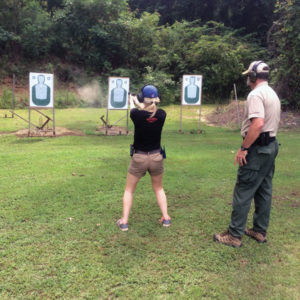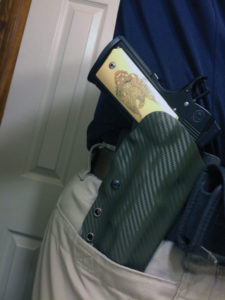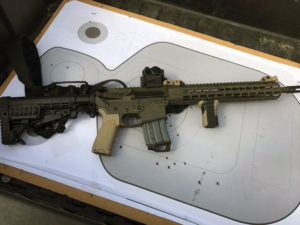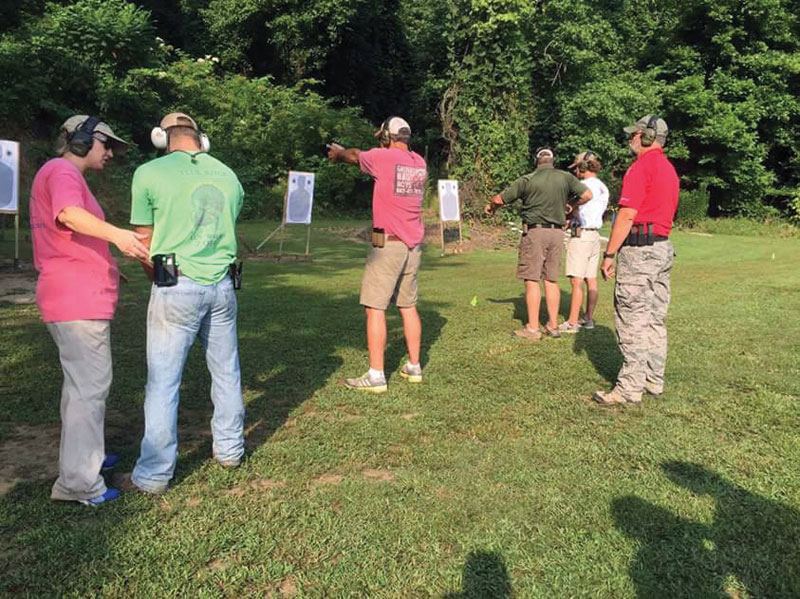By Angela Rogalski
 Firearms training is a vitally important part of owning a weapon. From maintaining the gun to handling it safely and accurately, taking your ownership responsibilities seriously can make the difference if you’re ever faced with a potentially dangerous defensive situation. That’s when calling in a professional is the best option for you to reach your goals.
Firearms training is a vitally important part of owning a weapon. From maintaining the gun to handling it safely and accurately, taking your ownership responsibilities seriously can make the difference if you’re ever faced with a potentially dangerous defensive situation. That’s when calling in a professional is the best option for you to reach your goals.
Delta Defense Training (deltadefensetraining.com), with range locations in Grenada and Greenwood, specializes in firearms training for civilian, law enforcement, military individuals and military contractors. From basic skills to learning to defend one’s self in a critical and life threatening situation, the levels of skill training taught are diverse and applicable.
Lee Wall is lead instructor and co-owner of Delta Defense Training. Along with Hal Williams, the two men administer the classroom and instructional range training needed to safely learn how to use a firearm. Both Wall and Williams are active Law Enforcement training consultants, Mississippi Department of Public Safety Enhanced Permit Certified Firearms Instructors, and current in continuing education training courses.
“Some of our courses require classroom instruction prior to going to the shooting range,” Wall says. “In most cases we’ll come to the client to do the classroom training because that makes it easier for the customer’s schedule. For the actual live fire portion of our courses, clients will come to one of our shooting ranges. We have one in Greenwood and one just north of Grenada. For clients with access to acceptable range facilities, we can also train them there. Our website will give you complete information as will our Facebook page.”
Wall has over thirty years’ experience teaching and working with firearms and is a course graduate of the Department of Homeland Security and Federal Law Enforcement Training Center. Hal Williams is an NRA Certified Civilian Handgun Instructor, and has been shooting competitively for eight years and currently holds a United States Practical Shooting Association (USPSA) Master Classification. They came together to start Delta Defense Training in 2010.
Wall is also a certified NRA law enforcement instructor in handgun, shotgun, and tactical shooting. Wall also holds  instructor certification in shoot house and advanced hostage rescue, and is currently a three division Master Class Shooter in the United States Practical Shooting Association (USPSA). The two men opened Delta Defense Training with the mission of meeting the continuing demand for quality and properly trained civilians and law enforcement in firearm skills, and to utilize the most modern and effective techniques to completely prepare each participant to competently, effectively, and safely employ a firearm in defense or competition.
instructor certification in shoot house and advanced hostage rescue, and is currently a three division Master Class Shooter in the United States Practical Shooting Association (USPSA). The two men opened Delta Defense Training with the mission of meeting the continuing demand for quality and properly trained civilians and law enforcement in firearm skills, and to utilize the most modern and effective techniques to completely prepare each participant to competently, effectively, and safely employ a firearm in defense or competition.
“But above all,” Wall says, “to instill a mindset of survivability in an ever increasingly violent world, remembering the mind is always the most effective and the first component in every situation.”
The levels of training are diverse and offer many different skillsets. “When we do scenario exercises for clients, we set up scenarios with movable walls and have various non-threatening and threatening situations. You get into the room and engage with these situations. For example I did a school staff last summer and I built a hallway that had doors staggered down the hallway. There were probably thirty no-threats scattered among the hallway and maybe one or two bad guys that they had to face. So, they had to learn to negotiate between non-threats and engage the threat parties. Without these types of situations, it’s not as realistic. The civilian who has chosen to carry a weapon for personal defense must learn how to negotiate around the no-threats in any given situation. The bad guy doesn’t care who he shoots, but you’re responsible for everything that comes out of the front of that firearm. So, the good guy, you, has to do as much as they can to limit the potential for collateral damage. You have to learn how to maneuver and engage a hostile.”
Wall adds that Delta Defense Training also specializes in training church security groups. They train school staff in proper use of firearms, and people who are very familiar with weapons, but want to continue their education about them.
“Church security is usually a twenty-two-hour class and by the end they understand how to work with a partner in close proximity to maneuver and search a building and employ deadly physical force if necessary” he says. “So, this is all-encompassing training.”
 The Mississippi Enhanced Permit class is the most basic training Delta Defense does and that’s an eight hour class, done in one day. From there the classes go from a Level One training all the way up to a Level Three class, with an Integrated Weapons class also offered. Courses may also be custom-tailored to fit a specific group’s needs.
The Mississippi Enhanced Permit class is the most basic training Delta Defense does and that’s an eight hour class, done in one day. From there the classes go from a Level One training all the way up to a Level Three class, with an Integrated Weapons class also offered. Courses may also be custom-tailored to fit a specific group’s needs.
“With the Integrated Weapons class, you learn how to manage a carbine and a handgun, such as special teams handle.” he adds. “These people are going into a high-threat circumstance and so they have a rifle, an M4, AR style, but they’re also carrying a sidearm as a backup weapon. It’s a required skill in understanding how to manage the two.”
Wall says firearm training is about efficient management under the constraint of time. “These are management classes. Any of these classes could be summed up with the statement that they are a management class; how to manage the firearm with the constraints of time. Time is critical, but accuracy is ultimate.”
Wall says if the client doesn’t own his or her own firearm, he would prefer they not go out and buy one for the classes.
“Chances are if the person has never had formal training, what they go out and buy won’t be what they need. We have loaner weapons available, pistols and rifles.”
Walls adds that firearm training doesn’t stop after the person receives his or her permit. “This is an ever-evolving skill and if a person doesn’t continue to exercise it and continue to expand it, it will diminish.”
Wall says they also cover the legal ramifications of when to shoot in their classes.
“I don’t care how much a person is trained or how many courses they have under their belt, no one can tell a person when to shoot. They have to be able to determine when they fall within the guidelines of being able to legally employ deadly physical force. So, we talk about that and stress that a person has to have a good, firm layperson’s knowledge of the law. In Mississippi, it’s fear of imminent, great bodily harm to you and those you are in charge of defending, such as anyone else that you know or have met who is in imminent danger of being harmed or killed.”
With Mississippi passing the Church Protection Act a few years ago, Wall adds that church security team training is also offered.
“And also schoolteacher training, along with church security, civilians, law enforcement, and military and military contractors. Everyone needs to know how to competently handle a firearm and to defend themselves should the need arise.”

